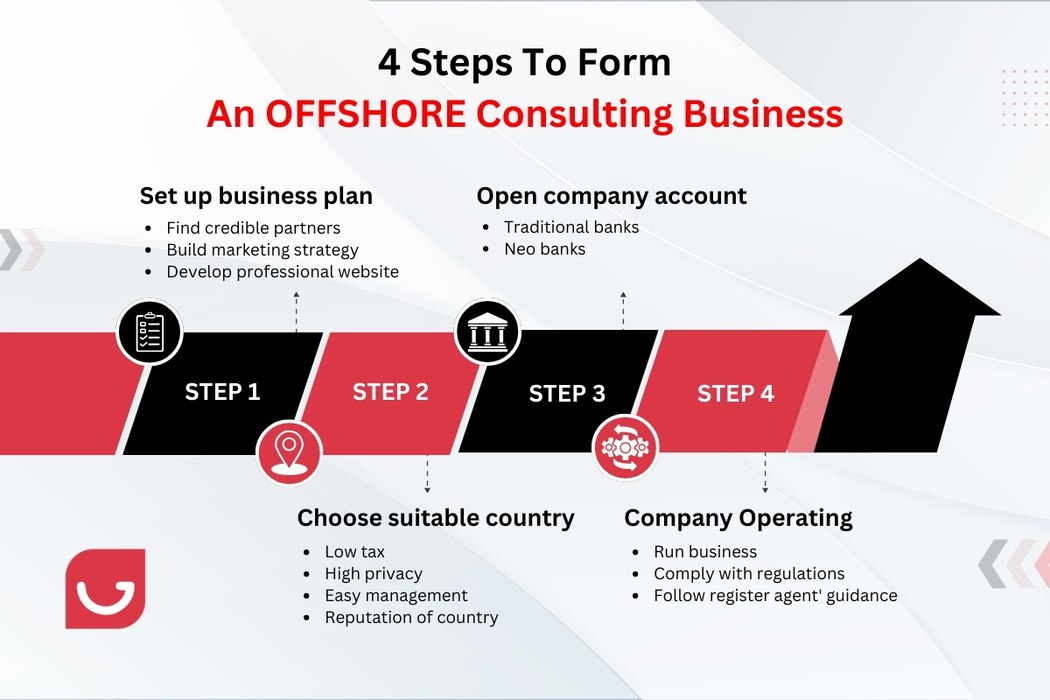How Offshore Business Formations Job: A Detailed Review for Entrepreneurs
Offshore firm formations can give significant benefits for business owners looking for tax obligation optimization and possession protection. The process involves numerous crucial steps, beginning with careful jurisdiction selection and extensive documentation prep work. Involving professional services is important for conformity. Nevertheless, lots of neglect the continuous obligations that follow first enrollment. Recognizing these complexities can make a considerable distinction in leveraging offshore chances successfully. The next actions are vital for long-term success.
Comprehending Offshore Firms: What They Are and Why They Issue
Although the idea of offshore companies might seem complicated, understanding their fundamental nature and value is vital for both people and companies seeking to maximize their monetary strategies. Offshore companies are entities registered outside the person's country of house, typically in territories that use beneficial regulative atmospheres. These companies can give different benefits, such as tax obligation optimization, property security, and boosted privacy.
For entrepreneurs, establishing an offshore company can help with worldwide profession, lower functional expenses, and broaden market reach. Furthermore, overseas business commonly permit for streamlined compliance with international laws. Individuals may also utilize offshore structures to safeguard personal properties from political or economic instability in their home countries. Ultimately, the charm of offshore companies depends on their capacity to improve financial adaptability and give strategic benefits in a significantly interconnected international economic situation - Offshore Company Formations. Recognizing their functional framework and advantages is essential for making informed choices
Selecting the Right Jurisdiction for Your Offshore Firm
Picking the appropriate territory for an offshore business is important for maximizing tax advantages and guaranteeing conformity with regional regulations. Various jurisdictions use varying tax obligation rewards and governing environments that can greatly influence company operations. As a result, a mindful analysis of these aspects is important for educated decision-making.
Tax Obligation Benefits Overview
When thinking about the facility of an overseas company, recognizing the tax benefits connected with numerous jurisdictions is necessary. Various places supply one-of-a-kind benefits, such as reduced or zero company tax obligation prices, which can significantly enhance profitability. Some territories supply tax obligation motivations for details kinds of organizations, attracting business owners seeking decreased tax obligation liabilities. In addition, particular countries apply favorable tax treaties that minimize dual tax on international income, making sure that organizations maintain even more profits. The option of territory additionally influences value-added tax (VAT) and various other regional tax obligations. Entrepreneurs should evaluate these elements very carefully to pick an area that straightens with their business objectives, maximizing tax obligation performance while staying certified with global laws.
Regulatory Setting Considerations
Picking the ideal jurisdiction for an offshore business needs a complete understanding of the regulative setting, as various countries enforce differing levels of conformity and governance. Entrepreneurs should evaluate variables such as lawful frameworks, tax obligation policies, and reporting responsibilities. Jurisdictions like the British Virgin Islands and Cayman Islands are commonly favored for their business-friendly regulations and very little coverage requirements. On the other hand, some nations may enforce stringent regulations that might make complex procedures and raise costs. Furthermore, the political security and credibility of a territory can impact the lasting viability of the offshore firm. Subsequently, cautious factor to consider of these regulatory aspects is vital to ensure that the chosen jurisdiction straightens with the business's tactical objectives and operational demands.
Preparing the Needed Documentation
Preparing the needed paperwork is an essential action in the overseas business development procedure. Entrepreneurs need to gather various legal and recognition records to facilitate their company's establishment in a foreign territory. Normally, this includes a thorough organization plan outlining the business's purposes and functional strategies. Furthermore, personal identification files, such as passports or motorist's licenses, are called for from the company's supervisors and shareholders.
In many cases, proof of address, like utility bills or financial institution declarations, is necessary to validate the identifications of the entailed events. Certain types dictated by the jurisdiction, including application forms for enrollment, should be finished accurately. Some territories might also require an affirmation of the nature of service activities and compliance with regional guidelines. Thoroughly preparing these files ensures a smoother enrollment process and assists minimize prospective hold-ups or problems, eventually establishing a solid foundation for the offshore entity.
Involving Expert Services for Offshore Formation
Involving expert solutions in overseas development can substantially improve the effectiveness and performance of the process. Entrepreneurs commonly deal with intricacies that can be frustrating, making skilled advice vital. Specialist companies concentrating on overseas formations provide a wealth of knowledge concerning territory choice, company framework, and regional market problems.
These specialists can assist in preparing essential documents, ensuring accuracy company website and compliance with certain needs. They additionally assist streamline communication with local authorities, minimizing the likelihood of misconceptions or delays. Additionally, professional services can offer understandings into strategic advantages, such as tax obligation advantages and asset defense, tailored to the entrepreneur's particular demands.
Navigating Regulatory Conformity and Legal Demands
Comprehending the regulatory landscape is essential for business owners beginning on overseas business developments. Conformity with regional laws and worldwide visit homepage regulations is crucial to stay clear of lawful challenges. Each territory has certain demands regarding business enrollment, reporting, and taxes, which have to be thoroughly researched.
Entrepreneurs need to acquaint themselves with the laws governing corporate structure, possession, and functional practices in the picked offshore area. Furthermore, anti-money laundering (AML) and understand your client (KYC) regulations often apply, requiring correct documentation and confirmation procedures.
Involving with legal specialists who concentrate on offshore solutions can offer vital assistance on navigating through these intricacies. Making certain compliance not just shields the business from possible lawful issues yet additionally enhances trustworthiness with companions, regulatory authorities, and capitalists. By adhering to the proposed lawful structures, entrepreneurs can effectively take advantage of the advantages of overseas company formations while decreasing risks related to non-compliance.
Establishing Financial and Financial Accounts

When an appropriate bank is identified, entrepreneurs typically need to prepare and send various papers, including evidence of identity, service registration records, and a description of the intended company activities. (Offshore Company Formations)
Some banks may additionally need a minimal deposit to open an account. Entrepreneurs should be prepared to respond to questions concerning the resource of funds and organization operations. By completely comprehending the banking landscape and following the financial institution's requirements, business owners can protect their offshore business has smooth accessibility to essential financial solutions for effective operation.
Keeping Your Offshore Company: Recurring Responsibilities and Best Practices
Preserving an overseas company includes a number of continuous responsibilities that are crucial for compliance and operational integrity. Key aspects include sticking to annual conformity needs, keeping exact financial documents, and comprehending tax obligations. These elements are crucial for making sure the firm's durability and legal standing in its jurisdiction.
Annual Compliance Needs
While developing an offshore company supplies countless benefits, it also entails ongoing responsibilities that can not be ignored. Yearly compliance demands vary by jurisdiction yet typically consist of sending annual returns and financial declarations to local authorities. Business have to likewise pay annual fees, which can include enrollment renewals and tax obligations, depending on the location. In enhancement, lots of jurisdictions require preserving a local rep and a licensed office. Failure to adhere to this page these guidelines can result in penalties, consisting of penalties or perhaps dissolution of the company. Business owners should additionally understand any kind of modifications in regional regulations that may affect their compliance responsibilities. Staying educated and arranged is crucial for maintaining the advantages of an offshore firm while satisfying legal obligations efficiently.
Maintaining Financial Records
Conformity with annual needs is just component of the ongoing duties connected with offshore company administration. Keeping exact financial documents is essential for guaranteeing transparency and liability. Entrepreneurs must methodically record all purchases, including earnings, expenditures, and assets. This technique not just aids in interior decision-making but likewise prepares the firm for potential audits from governing authorities.
Consistently updating monetary declarations, such as profit and loss accounts and annual report, is essential for tracking the company's financial health. Using accounting software program can simplify this process, making it easier to produce records and keep compliance. On top of that, entrepreneurs ought to take into consideration looking for expert audit solutions to assure adherence to regional policies and finest practices, therefore guarding the honesty and credibility of their offshore operations.

Tax Obligation Responsibilities Summary
Steering via the intricacies of tax obligations is essential for the successful management of an offshore business. Entrepreneurs should comprehend the tax regulations of both their home nation and the territory where the offshore entity is developed. Conformity with regional taxes laws is crucial, as failure to stick can bring about charges or lawful issues. Regularly submitting needed tax obligation returns, even when no tax obligation may be owed, is often required. Furthermore, maintaining current and precise monetary documents is essential for demonstrating conformity. Seeking recommendations from tax professionals accustomed to worldwide tax regulation can aid navigate these obligations properly. By applying finest methods, business owners can ensure that their offshore procedures remain legitimately certified and economically feasible.

Often Asked Concerns
How much time Does the Offshore Business Development Process Usually Take?
The overseas company development procedure commonly ranges from a couple of days to numerous weeks. Aspects influencing the timeline consist of jurisdiction, documentation needs, and responsiveness of legal and monetary establishments associated with the setup.
What Are the Costs Related To Preserving an Offshore Firm?
The expenses connected with maintaining an overseas company can differ widely. They generally consist of annual enrollment fees, conformity costs, accounting solutions, and feasible lawful fees, depending upon the jurisdiction and certain company tasks included.
Can I Open a Personal Financial Institution Account for My Offshore Company?
Opening up a personal checking account for an overseas company is typically not permitted. Offshore accounts must be service accounts, reflecting the business's tasks, thus following policies and ensuring correct economic monitoring and legal responsibility.
Are There Constraints on International Ownership of Offshore Business?

What Happens if I Fail to Abide With Offshore Rules?
Failure to follow overseas policies can result in extreme charges, consisting of significant penalties, loss of service licenses, and potential criminal fees. In addition, non-compliance may lead to reputational damages and troubles in future business procedures.
Offshore firms are entities signed up outside the person's country of home, frequently in territories that supply beneficial governing environments. Choosing the proper territory for an offshore business is crucial for maximizing tax advantages and ensuring compliance with regional policies. When thinking about the facility of an overseas firm, recognizing the tax advantages linked with numerous territories is essential. Selecting the best jurisdiction for an offshore company requires a complete understanding of the governing atmosphere, as different nations impose varying levels of conformity and administration. In addition, the political security and reputation of a territory can influence the long-term viability of the offshore business.